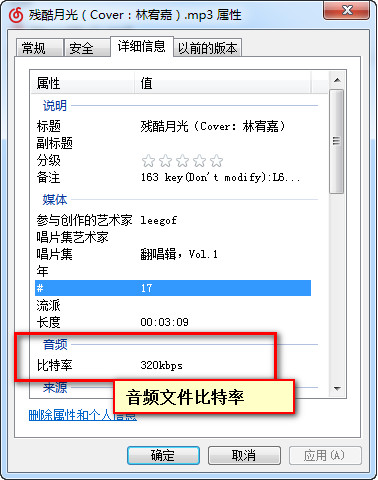需求: 使用IO流将指定目录下的若干个音频文件的高潮部分,进行剪切,并重新拼接成一首新的音频文件
思路(以两首歌为例):
第一首歌有一个输入流对象bis1。第二首歌有一个输入流对象bis2,他们公用一条输出流对象bos(在选择构造方法的时候选择含有布尔类型参数的那个),待第一首歌剪切完成后,在此基础上追加第二首歌的“高潮部分”。
实现代码:
1 import java.io.BufferedInputStream; 2 import java.io.BufferedOutputStream; 3 import java.io.File; 4 import java.io.FileInputStream; 5 import java.io.FileNotFoundException; 6 import java.io.FileOutputStream; 7 import java.io.IOException; 8 import java.io.InputStream; 9 /** 10 * 音乐剪切和拼接(音乐串烧) 11 * @author 12 * 13 */ 14 public class CutMusic { 15 16 public static void main(String[] args) { 17 //f1,f2分别为需要剪切的歌曲路径 18 File f1 = new File("E:\CutMusicTest\残酷月光(Cover:林宥嘉).mp3"); 19 File f2 = new File("E:\CutMusicTest\慢慢.mp3"); 20 //f为合并的歌曲 21 File f = new File("E:\CutMusicTest\MergeMusic.mp3"); 22 cut1(f1,f2,f); 23 } 24 25 public static void cut1(File f1,File f2,File f){ 26 BufferedInputStream bis1 = null; 27 BufferedInputStream bis2 = null; 28 BufferedOutputStream bos = null; 29 //第一首歌剪切部分起始字节 30 int start1 = 2375680;//320kbps(比特率)*58s*1024/8=2375680 比特率可以查看音频属性获知 31 int end1 = 4915200;//320kbps*120s*1024/8=4915200 32 33 //第二首歌剪切部分起始字节,计算方式同上 34 int start2 = 3686400; 35 int end2 = 5324800; 36 37 int tatol1 = 0; 38 int tatol2 = 0; 39 try { 40 //两个输入流 41 bis1 = new BufferedInputStream(new FileInputStream(f1)); 42 bis2 = new BufferedInputStream(new FileInputStream(f2)); 43 //缓冲字节输出流(true表示可以在流的后面追加数据,而不是覆盖!!) 44 bos = new BufferedOutputStream(new FileOutputStream(f,true)); 45 46 //第一首歌剪切、写入 47 byte[] b1= new byte[512]; 48 int len1 = 0; 49 while((len1 = bis1.read(b1))!=-1){ 50 tatol1+=len1; //累积tatol 51 if(tatol1<start1 ){ //tatol小于起始值则跳出本次循环 52 continue; 53 } 54 bos.write(b1); //写入的都是在我们预先指定的字节范围之内 55 if(tatol1>=end1 ){ //当tatol的值超过预先设定的范围,则立刻刷新bos流对象,并结束循环 56 bos.flush(); 57 break; 58 } 59 60 } 61 System.out.println("第一首歌剪切完成!"); 62 63 //第二首歌剪切、写入,原理同上 64 byte[] b2= new byte[512]; 65 int len2 = 0; 66 while((len2 = bis2.read(b2))!=-1){ 67 tatol2 += len2; 68 if(tatol2 < start2){ 69 continue; 70 } 71 bos.write(b2); 72 if(tatol2>=end2){ 73 bos.flush(); 74 break; 75 } 76 77 } 78 System.out.println("第二首歌剪切完成!"); 79 } catch (IOException e) { 80 // TODO Auto-generated catch block 81 e.printStackTrace(); 82 }finally{ 83 try {//切记要关闭流!! 84 if(bis1!=null) bis1.close(); 85 if(bis2!=null) bis2.close(); 86 if(bos!=null) bos.close(); 87 } catch (IOException e) { 88 // TODO Auto-generated catch block 89 e.printStackTrace(); 90 } 91 } 92 } 93 94 }
获取音频文件比特率的方式:

运行结果:
